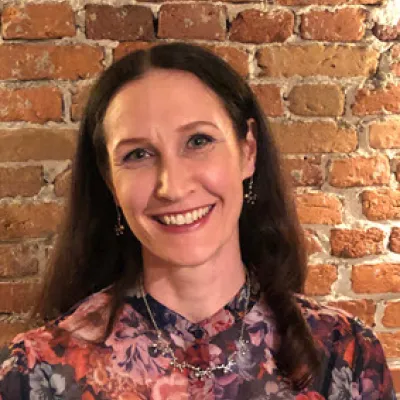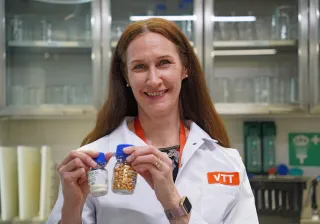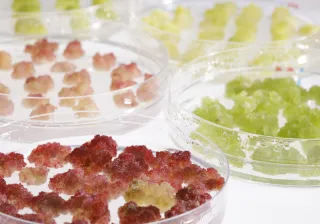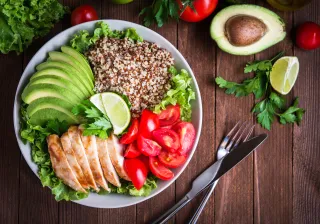VTT’s Research Manager Dr Emilia Nordlund has never had a set plan for her career – and yet, she has forged her own path as a respected scientist and an outspoken advocate for a more sustainable food system. “Being open to new things and opportunities has led me to work with inspiring people and do research that helps solve global problems“, Dr Nordlund says.
“When I was young, I had no idea of what I wanted to do when I grew up. After high school I started to study forestry engineering, but soon realized it wasn’t the right fit for me. I changed my major to chemistry, and suddenly things got more interesting,” Dr Nordlund recounts.
Dr Nordlund arrived to VTT when she started working on her master’s thesis. At that time, she had already had the chance to get to know the food system from different perspectives. She grew up on a farm, and during her studies she got to experience different summer jobs in the industry. One summer she found herself working in a slaughterhouse, another in a sugar mill, and later in her studies, she was getting deeper and deeper into the RDI of the food industry.
“After getting my master’s degree, I thought I was headed for a career in the food industry, but somehow found myself at VTT starting a PhD. And looking back now, I can say that in more than 15 years at VTT, I have never faced a moment when I would have wanted to leave,” Dr Nordlund says laughing, “I learned how closely VTT works with the industry, appreciated the cooperation across fields, and loved the environment and the smart people I got to work with.”
A field that keeps on giving
Since May 2021, Dr Nordlund has worked as Research Manager of Industrial Biotechnology and Food. In her current role, her responsibility is to look at the field and VTT’s research focus from a strategic perspective, but also to support other scientists and participate in projects herself.
I am the kind of person that gets inspired easily, and at VTT, we have an environment that allows us to try crazy things – which can really turn into business relevance.
“In my research area, VTT’s portfolio includes so many things with huge potential. We work to replace plastics with biomaterials, creating sustainable textiles, and of course, changing the food system. I don’t see this field ever becoming boring!” Dr Nordlund explains.
When asked about the things that get her excited about her work, Dr Nordlund names cellular agriculture as one the big topics with even bigger potential. In cellular agriculture, researchers use microbes and other cells to produce food ingredients. One recent example from VTT is the “eggs without chickens” concept which has gained a lot of attention internationally.
“I am the kind of person that gets inspired easily, and at VTT, we have an environment that allows us to try crazy things – which can really turn into business relevance. Just yesterday I got excited about how meat-like and bloody our new cellular agriculture product looked!”
We need to try radical things to change the food system.
It is this open, curious, and impact-driven approach to research that also motivates Dr Nordlund:
“We need to try radical things to change the food system. For example, the “eggs without chickens” idea started with: “What if we could do this disruptive, a little out-there thing?” Could we produce animal proteins in cell factories?’ Then we gave it a try – and the rest is history.”

Opportunities to grow
Before her current role as research manager, Dr Nordlund worked as team leader for Food Solutions for 13 years. In that role, she was able to experience, witness, and drive big developments – and develop herself.
“At VTT, I have been happy and lucky to get great opportunities to develop myself throughout the years. Only a few months after finishing my PhD I became a team leader, and even while in the same role, I had the chance to take on new challenges," Dr Nordlund tells.
When she first started, her team consisted of approximately ten people, and before the team was restructured last spring, it had grown to almost thirty. As the team grew, the research agenda also went through a transformation, and sustainability became a key theme across different projects.
At VTT, I have been happy and lucky to get great opportunities to continuously develop myself.
A big part of doing high-level research is building on the skills and strengths of a team of brilliant scientists.
“Managing people is always challenging. As a team leader you deal with expectations from every direction, but I absolutely loved being in that role. I get inspired by mentoring and supervising colleagues and PhD students, and to me, helping them grow as scientists has always been very fulfilling,” Dr Nordlund says.
The voice of science in the media
In the end of 2020, Finland’s largest newspaper Helsingin Sanomat compiled a list of people from different fields who will be talked about in 2021. Dr Nordlund was profiled alongside ten notable individuals from business, entertainment, and science.
I believe that we cannot maximise the impact of our work unless we can talk about it to the general public and to the stakeholders.
But becoming the face of future food was a surprise even to Dr Nordlund herself:
“Every personality test I have taken has scored me as a super introvert. Doing communications and being in the public eye has not come naturally to me. However, I believe that we cannot maximise the impact of our work unless we can talk about it to the general public and to the stakeholders,” Dr Nordlund says. “It’s an important part of my job, and with more experience, I have even learned to enjoy it.”
Nowadays, she appears regularly in the media and feels much more confident in her role as an expert voice for biotechnology and sustainable food systems.
“At VTT, I have got a lot of support in improving my communications and presenting skills and comfort level – and I also try to encourage and teach more junior scientists to focus on communications. Science-based information will only get more important in the future. For example, many new technologies and scientific breakthroughs can appear scary, and if we can’t communicate about things clearly, we will fail in changing consumer behaviour and reaching the sustainability targets.”
Emilia Nordlund’s top two reasons to work at VTT:
1. Impact! With the RDI activities that we do at VTT, and by implementing applied research, we can genuinely generate impact.
2. People. At VTT, we have an inspiring environment where people want to work together for a bigger target.






